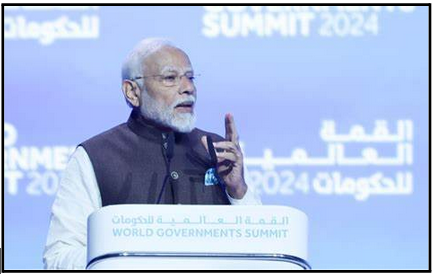GS2-IR
In the news
The 11th edition of the World Government Summit (WGS) took place in Dubai, United Arab Emirates. The Indian Prime Minister participated as a distinguished guest of honour and delivered a noteworthy keynote address.
About The World Government Summit
- The World Government Summit is a global, neutral, non-profit organisation committed to shaping the future of governments.
- Established in 2013 in Dubai, UAE, it serves as a prominent global knowledge exchange platform for governments.
- The Summit's activities revolve around exploring the agenda of the next generation of governments, with a focus on leveraging innovation and technology to address universal challenges facing humanity.
- Mission: To inspire and enable the next generation of governments.
- Vision: To become the global platform for shaping future governments.
- The theme of this year's summit was 'Shaping Future Governments', which brought together governments, international organisations, thought leaders, and private sector leaders worldwide for discussions and international cooperation. The aim was to enable governments to identify innovative solutions for future challenges.
- Objective: The World Government Summit 2024 aims to anticipate forthcoming opportunities and challenges while addressing critical global issues. By bringing together leaders, experts, and visionaries from around the world, the summit seeks to foster international cooperation and enable governments to identify innovative solutions for future challenges. It provides a platform for governments, international organisations, thought leaders, and private sector leaders to collaborate and inspire the next generation of governance.
- Awards: The World Government Summit Dubai will honour exemplary contributions with prestigious awards such as the ‘Best Minister in the World’, ‘Best Sustainable Development Practices’, and ‘Creative Government Innovations Award’.
|
About the GovTech Award
India
iRASTE Initiative
|
Key Themes of the Summit
- Government Acceleration and Transformation: Global governments are rapidly adopting digital technologies, presenting both opportunities and challenges. Policies must ensure digital inclusivity and drive economic growth amidst rapid technological changes.
- Reimagining Development and Future Economies: Adaptation and innovation are essential for competitiveness in a rapidly evolving economy. This involves embracing new technologies, business models, and societal trends to foster growth opportunities.
- Future Societies and Education: Focus on the interplay between societies, education, and the transformative potential of technology. Building inclusive, sustainable, and resilient societies is crucial for fostering scientific and technological advancements.
- Sustainability and Global Governance: Sustainability considerations are increasingly shaping global governance and the economy, particularly focusing on food, water, and energy security. Collaborative efforts are essential to ensure sustainable practices for equitable and resilient resource access.
- Urbanisation and Global Health Priorities: Addressing challenges and opportunities arising from urbanisation in relation to global health. Key areas include developing efficient transport systems, innovative urban designs, and prioritising the well-being of city residents to create sustainable and livable cities.
- Shaping Future Governments: Engaging in discussions with experts and thought leaders to envision the governance models of the future. This theme also includes recognizing and celebrating the achievements of innovators and pioneers worldwide.
|
About Dubai Evolution
Climate and Geography
Global Significance
Cultural Fabric
|
Conclusion
The World Government Summit 2024 served as a pivotal platform for global collaboration and innovation, addressing pressing challenges and envisioning the governance models of the future. With a focus on government acceleration, sustainable development, societal transformation, and urbanisation, the summit highlighted the importance of international cooperation in shaping the future of governments. Dubai, with its remarkable evolution from a fishing village to a global trade hub and economic powerhouse, symbolises the transformative potential of visionary leadership and strategic initiatives. Embracing its Islamic heritage while driving progress across diverse sectors, Dubai epitomises a commitment to holistic development and serves as an inspiration for nations worldwide.

